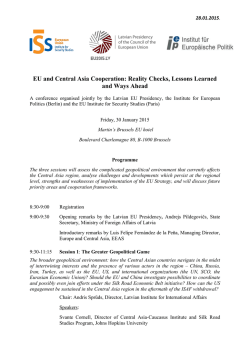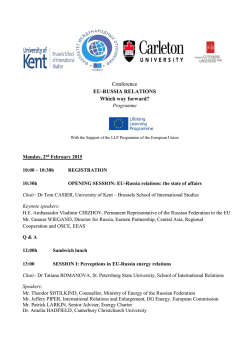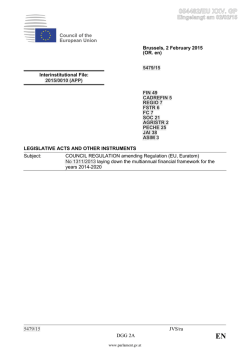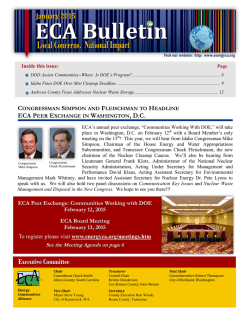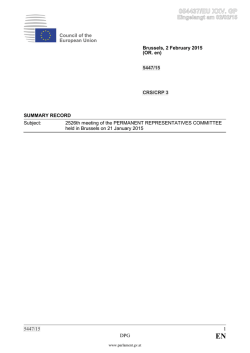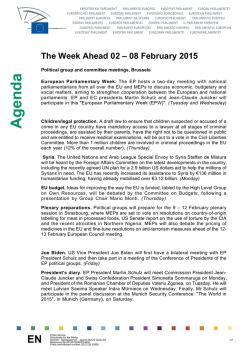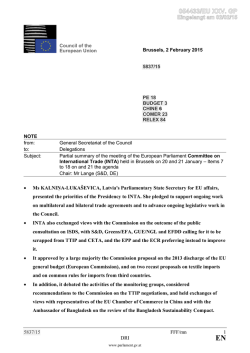
054436/EU XXV. GP
054436/EU XXV. GP Eingelangt am 02/02/15 Council of the European Union Brussels, 2 February 2015 5836/15 PE 17 INST 26 NOTE from: to: Subject: General Secretariat of the Council Delegations Partial summary record of the meeting of the European Parliament's Committee on Budgetary Control (CONT), held in Brussels on 26 and 27 January 2015 At the CONT meeting on 26 January 2015, Ms MOGHERINI outlined her commitment to ensure the continued delivery by the EEAS in times of austerity through a better management of its staff and logistics. Mr WELLE, Secretary General of the EP, estimated that the electoral campaign launched by the EP had increased the number of voters taking part in the EP poll by around 9 million. Ms DAY, Secretary General of the Commission, welcomed the interest shown recently by the Council in the transparency Register. Vice President Timmermans would consult both the Council and the EP before the Commission tabled a proposal for a mandatory Register. Ms GRÄSSLE wanted provisions guaranteeing the political mandate of MEPs. The meeting was chaired by Ms GRÄSSLE (EPP, DE). 5836/15 GC/lo DRI www.parlament.gv.at 1 EN 1. Discharge 2013: EU general budget - European External Action Service Ms MOGHERINI, High Representative and Vice President of the Commission said that the 2013 EEAS review had been a useful basis for shaping a sound administrative background for the EEAS' work, in particular in times of austerity. Savings should not put the effectiveness of the EEAS' action in jeopardy. She and the new Secretary General of the EEAS Alain Le Roy would ensure a follow-up of the review. Ms MOGHERINI pointed out that the EEAS was part of the 5% (1% per year) staff reduction, which had resulted in a decrease of 17 staff members per year. Three delegations had been relocated in more sensitive areas (Libya, Myanmar and the United Arab Emirates). A real estate policy was being reshaped. The gender balance of the staff remained a top priority. The number of women among Heads of Delegations had increased in recent years. The geographical balance of staff was satisfactory, with 17.7 percent of the Heads of Delegation (or equivalent posts) being nationals of Member States that had joined after 2004. The number of diplomats from Member States was also a success story, as they now represented 33% of the whole staff. She also mentioned an administrative agreement entered into with OLAF. The establishment of the Commissioners' Group on External Action (CGEA) would give a new impetus to the co-ordination of Commissioners with responsibility in the area of external relations. The Group had already met twice and discussed issues ranging from Ukraine and Russia to climate change and Heading 4 of the EU budget. Ms MOGHERINI told Mr CZARNECKI, rapporteur, that Mr JACQUE's report on EULEX Kosovo would be ready at the end of March. Mr CHILD from the EEAS then provided more detailed information on broader questions from the MEPs. He told the rapporteur, who inquired about the policy applicable to the EU Special Representatives that their future role was being reviewed with a view to ensuring close cooperation with the EEAS. To that end it would be preferable for them to be located in the same building as delegations, not least since some of them were 'double-hatted'. 5836/15 GC/lo DRI www.parlament.gv.at 2 EN He agreed with Ms AYALA SENDER (S&D, ES) that staff working conditions needed to be advantageous for those workers posted to difficult places. Ms GRÄSSLE pointed out that EEAS staff were still some of the best paid staff in the world. Mr CHILD insisted that the EEAS should remain attractive to staff. He acknowledged that economic treatment of seconded staff could vary, given that some Member States provided allowances that went above what was paid by the EEAS. Nevertheless, a policy of seconding staff at no cost to the EEAS was being introduced. He told Mr THEURER that the Lisbon Treaty spirit was developing, with Member States taking advantage of the EEAS activity and gave the example of Eritrea. Nevertheless, consular cooperation remained within the remit of the Member States. He told Mr PARGNEAUX (S&D, FR) and Ms GRÄSSLE that the EEAS was not responsible for operational spending and in particular for the aid provided to the Sahrawi refugees. Mr FAZAKAS, member of the European Court of Auditors, told Ms GRÄSSLE that the ECA was preparing a special report on EU budgetary support to Ukraine, where the MEP felt that corruption was rife. 2. Discharge 2013: EU general budget - European Parliament Mr TOME MUGURUZA, member of the ECA, pointed out that none of the 28 cases of transaction sampling examined by the ECA were affected by error. Mr GALVIN, internal auditor, found the review rather positive, with some remarks on the payment of groups of visitors in cash and on the in-house travel agency. Vice-President SASSOLI (S&D, IT) considered that the EP should no longer be freely accessible to visitors, owing to security concerns. In his view, more competition was needed to provide better services. He also stressed the high degree of transparency guaranteed by the budgetary procedure inside the EP. 5836/15 GC/lo DRI www.parlament.gv.at 3 EN Mr WELLE, Secretary-General, underlined the savings resulting from the interpretation and translation policies and from the redeployment of staff, in particular following an agreement with the Committee of the Regions. The paper-free policy had also generated savings, whilst boosting the IT policy. He underlined the enhanced visibility for the EP thanks to the electoral campaign, which had also helped increase the number of electors taking part in the poll by around 9 million (to de JONG, GUE/NGL, NL). Mr PARGNEAUX (S&D, FR) highlighted the savings provided by videoconferences and considered that cash payments to visitors should be phased out. Mr WELLE told Mr PIEPER (EPP, DE) that the House of European History had so far cost EUR 55 million and that EUR 12 million were needed to operate it annually. He insisted on the value of the centre which would document European democracy. He told Mr VALLI (EFDD, IT) that the financing of political parties and political foundations ensured transparent public financing and was widely used across the Member States. Electronic vote *** 3. Financial rules applicable to the general budget of the Union The opinion was adopted, as amended, with 22 votes in favour and 2 against. 4. Discharge 2013: EU general budget - European Commission Ms DAY, Secretary-General, underlined her commitment to strengthening performance management and stressed the importance of linking the funding of programmes to targets. She assured Ms GRÄSSLE, rapporteur, that result measuring would continue to be reported in the synthesis report and that overall figures would be provided, without separation into the programmes of individual DGs. Some of the EU 2020 strategy's targets were already being delivered despite the economic crisis, such as the reduction in early school leavers. 5836/15 GC/lo DRI www.parlament.gv.at 4 EN She told the rapporteur that the Commission was still preparing its proposal on the transparency Register to make it mandatory. Council had shown interest in joining the Register so Vice-President Timmermans would consult both the Council and the Commission before tabling the proposal. She told Mr VAUGHAN (S&D, UK) that the approach of the Commission would be to include it in a Inter-Institutional Agreement, in which the Council would participate. Mr THEURER (ALDE, DE) disagreed with Ms GRÄSSLE that provisions on transparency should take into account the political nature of MEPs, so that only Commissioners should abide by them fully. Ms DAY also provided him with explanations about the reinforcement of the Commission General Secretariat in supporting the work of the Vice-Presidents. She insisted on the distinction between fraud and irregularities that might be unintentional. Complex rules were part of the problem and she regretted that the co-legislators had helped complicate the simplified proposals tabled by the Commission. She also warned against the cost and disincentive effect of excessive control. She repeatedly stated that it was not for the Commission to address the way OLAF drafted statistics nor to comment on the quality of relations between the Director-General of OLAF and the Supervisory Committee. She recalled that both the DG of OLAF and the SC regularly appeared before the CONT Committee, which could put questions directly to them. As regards the protection of human rights, Ms DAY stressed that a proposal to establish a European Public Prosecutor Office, which would also deal with the right of defence, had been tabled. Since not all Member States wanted the Office, an additional proposal had been made to align the rights of defence within OLAF with the EPPO proposal. Both proposals were still pending. 5. 2013 Discharge to the Agencies Mr GALEA, member of the ECA, stressed that all agencies had been granted an unqualified opinion, except for the European Institute of Innovation and Technology (EIT) and FRONTEX. 5836/15 GC/lo DRI www.parlament.gv.at 5 EN Mr Morten KJAERUM, director of the European Union Agency for Fundamental Rights (FRA), on behalf of the Agencies' network, underlined the importance of agencies' networking so as to address horizontal issues common to all agencies and exchange good practices. He welcomed the ECA report and noticed that the number of remarks from the ECA had decreased to 97 in 2013, compared to 123 in 2012. The number of questions put by the CONT committee had increased, however. In response to some horizontal questions put by Mr CZARNECKI, rapporteur, on the 5% decrease in staff, Mr KJAERUM considered that this requirement had been met, but complained that the 2015 budget had asked agencies - but no other EU institution or bodies - to pool 5% of their staff, which in his view resulted in a further 5% cut in staff. He also referred to a meeting with the Budgetary Committee in Council to address the thorny issue of carry-overs. He felt that although these conflicted with the principle of annual budgets, parameters should be set to assess them, so that they could be acceptable, for instance, when deletions were low or carry-overs had been planned. He also assured the rapporteur that 88% of the agencies had policies in place to address conflicts of interest. The director of the EIT accepted all the ECA remarks and added that the high staff turnover was partially due to the low salary offered at its seat in Budapest. The issue had been addressed by the new managers who had succeeded in increasing staff by 15%. As regards the shortcomings, in particular on audit certificates, he felt these were teething problems linked to a newly established agency. Action had now been taken and results were beginning to be seen. Mr SARVAMAA wondered how long the agency's teething problems would be used as an excuse in the discharge procedure. The representative of FRONTEX underlined that ex ante controls had been put in place and that documents such as fuel invoices and patrolling reports were requested from the National authorities asking the Agency for ships or aircrafts. The representative of EU-LISA told the rapporteur that a seat agreement had been concluded with the Estonian government and was being ratified by the national parliament. Further details were provided by the directors of the European Security and Markets Authority and the European Railways Agency, who specifically assured Ms SCHMIDT (EPP, AT) that all operative activities of the Agency were concentrated in Valenciennes. Mr ZDECHOVSKY (EPP, CZ) called on agencies to improve their web sites. 5836/15 GC/lo DRI www.parlament.gv.at 6 EN 6. 2013 Discharge to the Joint Undertakings Mr GALEA, member of the ECA, underlined the role that Joint Undertakings (JUs) - which are public private partnerships - played in promoting innovation and research in cutting-edge technologies. The ECA had issued a qualified opinion on four JUs that had been invited to the meeting. The Director of the Innovative Medicine Initiative JU told Mr CZARNECKI, co-rapporteur, that this year the error rate had been reduced to just above 2%. Ex ante checks had been conducted without burdens for the beneficiaries. The accounting system had been validated. The Director of the ECSEL JU, who also represented ARTEMIS and ENIAC, told Mr CZARNECKI that the ECA had found shortcomings in the audit carried out by the Member State participating in the JU. The Director of the ITER JU told Mr VISTISEN (ECR, DK) that cost estimates could only be provided on the basis of a reliable work schedule. The current one was not credible, since it had been established on a top down basis on political grounds. He stressed to Mr SOLTES (GREENS/ALE, SL) the value of ITER as a long-haul project, which was, moreover, supported by seven international partners. He acknowledged that investing in the project was risky, but it could have huge returns since nuclear fusion would be a free, clean and inexhaustible source of energy. He said the cost of the project corresponded to twelve hours' energy consumption by the participating countries. He also reassured the co rapporteurs that ITER abided by the relevant intellectual property rights. 7. Next meetings x 23 February 2015, 15.00 – 18.30 (Brussels) x 24 February 2015, 9.00 – 12.30 and 15.00 – 18.30 (Brussels) ___________________ 5836/15 GC/lo DRI www.parlament.gv.at 7 EN
© Copyright 2026
